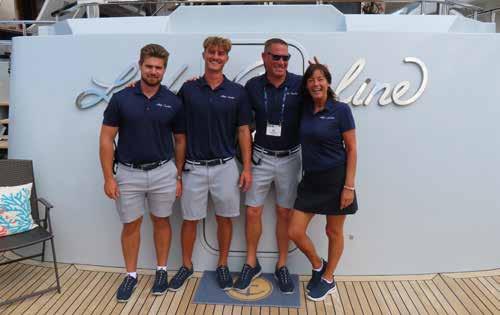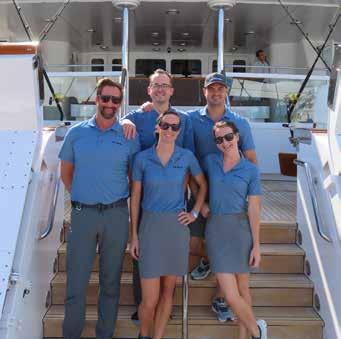

All Hands on Deck! On the docks at PBIBS DAILY BOAT SHOW Wednesday, April 24 Pier 66 Marina South Reserve your booth: Expo@TritonNews.com SATURDAY 3.23.24 GET YOUR TICKET HERE! Palm Beach International Boat Show 2024

Two-thirds of the Earth is covered in water...maybe it’s time you took command of your future with a marine career. Whether you dream of overlooking the world from your window office as a Captain or Engineer, Deckhand or Cabin Steward(ess), consider MPT your passport to a world of job opportunities and the training they require. As the most complete full-service, private maritime school in the country, our success-driven instructors, equipment and programs have helped thousands of aspiring yacht and merchant crew launch rewarding careers. 954.525.1014
ONE SCHOOL. UNLIMITED POSSIBILITIES.
| 1915 South Andrews Avenue, Fort Lauderdale, FL 33316 | mptusa.com Sea the World
Get your future in shipshape, ENROLL AT MPT NOW! Call Toll-Free: 1.888.839.5025 or Visit MPTusa.com
Sailing Legends
Entertain and Educate
BY JIM BRONSTIEN

Sailboats on display may be few and far between at PBIBS, but at the annual Business Leadership Luncheon held aboard South Beach Lady Thursday, sailing and racing was front and center. Legendary winner of the 1977 America’s Cup, famed broadcaster, and author Gary Jobson, alongside Chris Flowers, owner of the winning Maxi racer Galateia and 52-meter Vitters S/Y Anne, gave a crowd of 250 invited attendees a very entertaining and enlightening glimpse into their world of sailing, racing, and broadcasting.
Jobson is a lifetime sailor, author of 23 books about sailing, and the tactician behind Ted Turner’s historical run on Courageous to win the America’s Cup. To many, he may be more recently known as the iconic broadcaster of sailing races on both ESPN and NBC. His team at ESPN was the first to ever get cameras and microphones on America’s Cup boats, which transformed the popularity of those races into must-see TV. In fact, the “laser lines” that you see on TV that designate the starting and finish lines and all the other technological graphics were a first in television broadcasting and were later discovered by the National Football
League, which is how the NFL came to adopt their own “laser lines” for first down markers.
Flowers, a private equity investor, explained that his love for Maxi racing comes with an equal passion for chess. When asked which is a more entertaining spectator sport, he mused, “Chess, of course, as you are always at the edge of your seat!” No matter if you are a sailing expert or uninformed of the intricacies between Maxi racing (owners must steer the boat) and America’s Cup racing (a scientific and technological competition), these two iconic gentlemen know their craft!
The Olympics sailboat racing this July in Paris will be announced by Jobson for NBC and then he, and many others, will make their way to Barcelona for the Cup races in September and October. When asked to predict the outcome, Jobson believes Italy and “American Magic” will compete to see who will challenge New Zealand for the Cup. His hope is that America will prevail and bring the Cup back home to Newport. Whatever the result, this is a summer for racing. Watch it all on NBC and ESPN.

3 Triton Daily is published by YATCO, LLC, the parent company of Triton: News & Networking for Captains and Crew
2021. All rights reserved.
Copyright

All in a day’s work.
Work hard, play hard — captains and crew dig in on day three.




details,
4
PHOTOS BY LINDSEY HANRAHAN AND KEVIN MAHER
Details,
details!






5



Four
,




your
pocket size luxury guide YATCO.
Palm Beach, Florida $3,850,000 USD Boca Grande, Florida $2,595,000 USD
highlighted classic yachts on display, courtesy of YATCO, West
Palm Beach, Florida $2,100,000 USD
1966 BURGER 100’
SOVEREIGN
SERENA West Palm Beach, Florida $4,000,000 USD 6 SCANQRCODE TOSEARCHTHESHOW SEARCH THE SHOW ONLINE! Browse vessels available at the Palm Beach International Boat Show. View real-time market updates and schedule showings from your phone. VISIT
#205 xpel.com/marine
1964 FEADSHIP 73’ 10”
US IN EVERNIA TENT BOOTH
The Cost of Crew Replacements
BY LAUREN BECK
Tim Clarke, managing director of Quay Crew in the U.K., got the debate going on LinkedIn when he posed one simple question: How much does it really cost to replace one crewmember?
According to Quay Crew’s research, it could cost about €20,000 for a junior crewmember to be replaced. The figure came from one family office analysis, where Quay Crew arrived at €21,000.
Included in that figure are the more obvious costs — flights, crew agency fees, etc. — but other hidden costs drive up the total, Clarke said.
Comments on his post showed others believed costs could range even higher, as much as double, according to one respondent. Senior crew with their tickets and experience may be more expensive to replace, and repatriation,

depending on location, could incur significant fees.
Chief Engineer Duncan MacLean commented on Clarke’s post that costs could be higher for engineering departments, and he also pointed to a loss of knowledge when senior crewmembers depart. It’s “complex to quantify,” he said, but “every yacht has its own quirks.
The first time tracing a location of a piece of equipment in a deckhead might take hours. Would you apportion a value to that knowledge?”
As other posters shared, there can be a team reliability cost as changes in structure and departing colleagues are also an “immeasurable” invisible cost.
Of course, Clarke emphasized, this assumes you want to keep the


crewmember. If it’s not a good fit, Clarke recommends getting rid of them “at the first possible opportunity.”
“In summary, retaining crew is far, far cheaper than replacing them,” Clarke said. In a follow-up post, Clarke said, “Contrary to popular belief, as a recruiter, I don’t want to see clients with high turnover. I much prefer working with decent clients who come to me less frequently but commit to finding the right hire.” «
quaycrew.com

With over 30 years of yacht fueling experience around the globe, the team at Tango Sierra has a lot to offer. Whether you’re cruising the familiar areas of yachting like the Caribbean, U.S. and Mediterranean, or blazing new trails to more remote parts of the world, we have the specialized knowledge and experience to keep you moving.



TANGO SIERRA LLC | 717 CUR L EW R OAD, D E L RAY BEA C H F L ORIDA 33444 IN F O@ T ANGO S IERRA.U S | WWW. T ANGO S IERRA.U S | 561.320.3835
Gail Vanstone 954.806.3884 gail@tangosierra.us
Marianne Vanstone 954.646.8388 marianne@tangosierra.us
Tango Sierra works with a straightforward, back to basics philosophy of a business run honestly and simply with good communication, fair prices and great service to bring you the highest quality fuels and lubricants around the world.






























